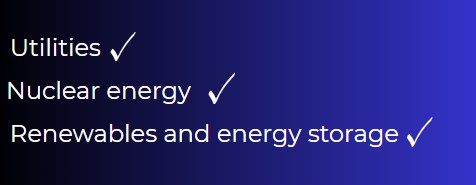How Can Investors Profit From AI's Energy Use?
Global energy demand is expected to grow by leaps and bounds over the next several years as AI usage accelerates. Here's how to get a piece of the pie.


Profit and prosper with the best of Kiplinger's advice on investing, taxes, retirement, personal finance and much more. Delivered daily. Enter your email in the box and click Sign Me Up.
You are now subscribed
Your newsletter sign-up was successful
Want to add more newsletters?

Delivered daily
Kiplinger Today
Profit and prosper with the best of Kiplinger's advice on investing, taxes, retirement, personal finance and much more delivered daily. Smart money moves start here.

Sent five days a week
Kiplinger A Step Ahead
Get practical help to make better financial decisions in your everyday life, from spending to savings on top deals.

Delivered daily
Kiplinger Closing Bell
Get today's biggest financial and investing headlines delivered to your inbox every day the U.S. stock market is open.

Sent twice a week
Kiplinger Adviser Intel
Financial pros across the country share best practices and fresh tactics to preserve and grow your wealth.

Delivered weekly
Kiplinger Tax Tips
Trim your federal and state tax bills with practical tax-planning and tax-cutting strategies.

Sent twice a week
Kiplinger Retirement Tips
Your twice-a-week guide to planning and enjoying a financially secure and richly rewarding retirement

Sent bimonthly.
Kiplinger Adviser Angle
Insights for advisers, wealth managers and other financial professionals.

Sent twice a week
Kiplinger Investing Weekly
Your twice-a-week roundup of promising stocks, funds, companies and industries you should consider, ones you should avoid, and why.

Sent weekly for six weeks
Kiplinger Invest for Retirement
Your step-by-step six-part series on how to invest for retirement, from devising a successful strategy to exactly which investments to choose.
Imagine buying the most advanced oven ever invented. It cooks every meal for you, from start to finish, freeing up time and improving your life. But when the first electric bill arrives, you're shocked to see how much power it guzzles.
That's the situation unfolding with artificial intelligence (AI).
As AI revolutionizes industries and reshapes daily life, it's also quietly creating a massive new demand for electricity. This could transform parts of the energy and utility sectors and offer opportunities for investors.
From just $107.88 $24.99 for Kiplinger Personal Finance
Become a smarter, better informed investor. Subscribe from just $107.88 $24.99, plus get up to 4 Special Issues

Sign up for Kiplinger’s Free Newsletters
Profit and prosper with the best of expert advice on investing, taxes, retirement, personal finance and more - straight to your e-mail.
Profit and prosper with the best of expert advice - straight to your e-mail.
Why does AI need so much energy?
The rise of generative AI tools like ChatGPT and large language models (LLMs) requires vast computing power, which means more data centers – and lots of them.
These centers aren't just warehouses of servers. They're energy-intensive hubs that need constant cooling, high uptime and reliable power sources.
According to McKinsey & Co., global demand for data center capacity could rise by more than 20% per year through 2030. Goldman Sachs projects that AI alone could drive a 165% increase in data center electricity use by then.
This surge has sparked (no pun intended) renewed interest in energy infrastructure and even formerly taboo sources of power.
Microsoft (MSFT), for example, made headlines recently for giving a second life to Three Mile Island – a site best known for its 1979 partial nuclear meltdown – by exploring it as a clean power source for future data centers.
The thinking is simple: Nuclear energy, which produces zero greenhouse gas emissions, is a potential lifeline for AI's hungry backend.
Where might investors look to profit?
The dramatic shift in energy usage brought on by AI is sending ripple effects across several sectors. While nothing is guaranteed, certain areas are emerging as potential long-term beneficiaries.
Ben Loughery, founder and managing principal of Lock Wealth Management, believes utilities and energy infrastructure are particularly well-positioned.
"The key is to identify which companies are setting themselves up as the backbone of AI – not just riding the hype," Loughery says.

Utility stocks are perhaps the most direct beneficiaries of rising power demand. Some companies are already expanding capacity to meet the energy needs of growing data center hubs.
Dominion Energy (D), for instance, serves Northern Virginia, which is now the largest and fastest-growing data center market in the U.S.
For those seeking broader exposure, exchange-traded funds (ETFs) and mutual funds focused on utility companies offer a diversified way to participate in the trend.
The Utilities Select Sector SPDR Fund (XLU), which holds major electric and natural gas producers, provides a low-cost option to track the sector's performance.
Meanwhile, nuclear energy is experiencing something of a revival, thanks to its high efficiency and zero-carbon emissions. That has brought new attention to companies in the space.
The nuclear project involving Microsoft, mentioned earlier, includes a partnership with Constellation Energy (CEG), the largest owner of nuclear power plants in the country.
Startups are also entering the picture. One to watch is Oklo, which is developing compact nuclear reactors that could eventually power small-scale AI operations.
Backed by investors like Peter Thiel and OpenAI's Sam Altman, Oklo represents a cutting-edge bet on clean, scalable energy technology.
Renewables and energy storage are another piece of the puzzle. As more data centers come online, particularly those operated by companies with net-zero emissions goals, the demand for clean energy and better storage solutions is rising fast.
NextEra Energy (NEE), one of the world's largest producers of renewable energy from wind and solar, stands out in this space.
Other notable names include Brookfield Renewable (BEPC), which owns and operates a global portfolio of clean power assets, and First Solar (FSLR), a leading manufacturer of solar panels and developer of utility-scale photovoltaic systems.
For broader exposure, clean energy ETFs offer a way to invest in this potential trend through a diversified basket of companies.
One option is the iShares Global Clean Energy ETF (ICLN). The fund holds roughly 100 of the largest clean energy companies worldwide and is among the most actively traded and widely held funds in the industry.
Keep in mind
Even the most promising trends come with risk, and this one is no exception. As the AI boom reshapes the energy landscape, investors should proceed thoughtfully.
"Regulatory uncertainty is always something to pay attention to," Loughery cautions. Policy changes, especially around nuclear energy or emissions, could throw things into flux quickly.
While the long-term trend is compelling, not every company will emerge as a winner.
That's why it pays to do your homework. Understanding the fundamentals behind a company's role in the AI energy ecosystem is key.
For many investors, diversifying within the industry may be a more effective approach than betting on a single stock.
Finding the best ETFs to buy that are focused on clean energy, utility or infrastructure stocks can offer exposure across multiple players while spreading out the risk.
Perhaps most importantly, this is a long game. The relationship between AI and energy is just beginning to take shape. Volatility and growing pains are often part of the process.
Related content
- Rising AI Demand Stokes Undersea Investments
- CoreWeave IPO: Should You Buy CRWV Stock?
- 10 Major AI Companies You Should Know
- How Emerging Technologies May Influence the Future of Capital Markets
- The Explosion of New AI Tools
Profit and prosper with the best of Kiplinger's advice on investing, taxes, retirement, personal finance and much more. Delivered daily. Enter your email in the box and click Sign Me Up.

Jacob Schroeder is a financial writer covering topics related to personal finance and retirement. Over the course of a decade in the financial services industry, he has written materials to educate people on saving, investing and life in retirement.
With the love of telling a good story, his work has appeared in publications including Yahoo Finance, Wealth Management magazine, The Detroit News and, as a short-story writer, various literary journals. He is also the creator of the finance newsletter The Root of All (https://rootofall.substack.com/), exploring how money shapes the world around us. Drawing from research and personal experiences, he relates lessons that readers can apply to make more informed financial decisions and live happier lives.
-
 Quiz: Do You Know How to Avoid the "Medigap Trap?"
Quiz: Do You Know How to Avoid the "Medigap Trap?"Quiz Test your basic knowledge of the "Medigap Trap" in our quick quiz.
-
 5 Top Tax-Efficient Mutual Funds for Smarter Investing
5 Top Tax-Efficient Mutual Funds for Smarter InvestingMutual funds are many things, but "tax-friendly" usually isn't one of them. These are the exceptions.
-
 AI Sparks Existential Crisis for Software Stocks
AI Sparks Existential Crisis for Software StocksThe Kiplinger Letter Fears that SaaS subscription software could be rendered obsolete by artificial intelligence make investors jittery.
-
 5 Top Tax-Efficient Mutual Funds for Smarter Investing
5 Top Tax-Efficient Mutual Funds for Smarter InvestingMutual funds are many things, but "tax-friendly" usually isn't one of them. These are the exceptions.
-
 Why Invest In Mutual Funds When ETFs Exist?
Why Invest In Mutual Funds When ETFs Exist?Exchange-traded funds are cheaper, more tax-efficient and more flexible. But don't put mutual funds out to pasture quite yet.
-
 Social Security Break-Even Math Is Helpful, But Don't Let It Dictate When You'll File
Social Security Break-Even Math Is Helpful, But Don't Let It Dictate When You'll FileYour Social Security break-even age tells you how long you'd need to live for delaying to pay off, but shouldn't be the sole basis for deciding when to claim.
-
 I'm an Opportunity Zone Pro: This Is How to Deliver Roth-Like Tax-Free Growth (Without Contribution Limits)
I'm an Opportunity Zone Pro: This Is How to Deliver Roth-Like Tax-Free Growth (Without Contribution Limits)Investors who combine Roth IRAs, the gold standard of tax-free savings, with qualified opportunity funds could enjoy decades of tax-free growth.
-
 One of the Most Powerful Wealth-Building Moves a Woman Can Make: A Midcareer Pivot
One of the Most Powerful Wealth-Building Moves a Woman Can Make: A Midcareer PivotIf it feels like you can't sustain what you're doing for the next 20 years, it's time for an honest look at what's draining you and what energizes you.
-
 Stocks Make More Big Up and Down Moves: Stock Market Today
Stocks Make More Big Up and Down Moves: Stock Market TodayThe impact of revolutionary technology has replaced world-changing trade policy as the major variable for markets, with mixed results for sectors and stocks.
-
 I'm a Wealth Adviser Obsessed With Mahjong: Here Are 8 Ways It Can Teach Us How to Manage Our Money
I'm a Wealth Adviser Obsessed With Mahjong: Here Are 8 Ways It Can Teach Us How to Manage Our MoneyThis increasingly popular Chinese game can teach us not only how to help manage our money but also how important it is to connect with other people.
-
 Looking for a Financial Book That Won't Put Your Young Adult to Sleep? This One Makes 'Cents'
Looking for a Financial Book That Won't Put Your Young Adult to Sleep? This One Makes 'Cents'"Wealth Your Way" by Cosmo DeStefano offers a highly accessible guide for young adults and their parents on building wealth through simple, consistent habits.